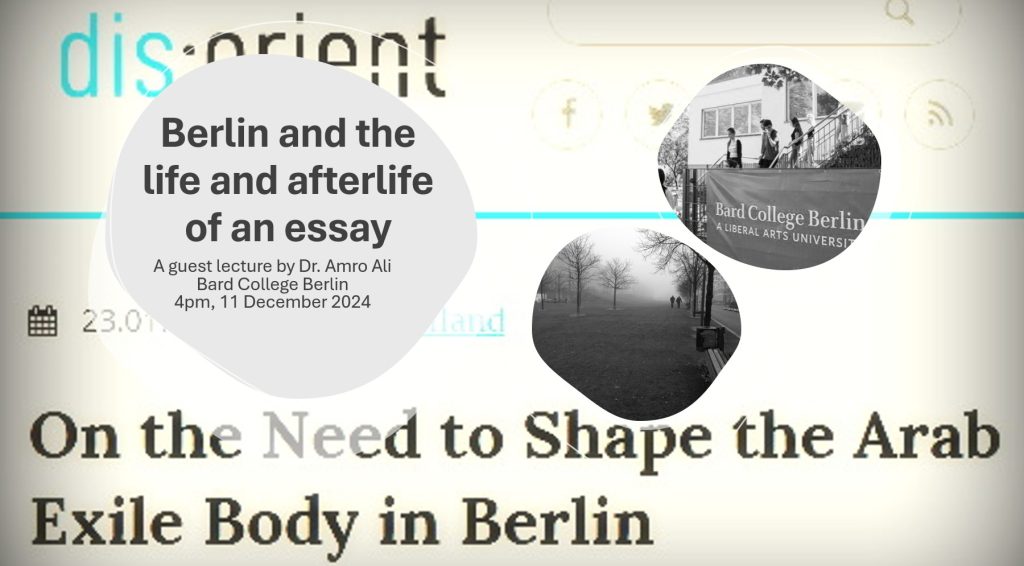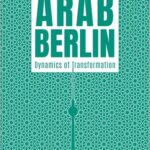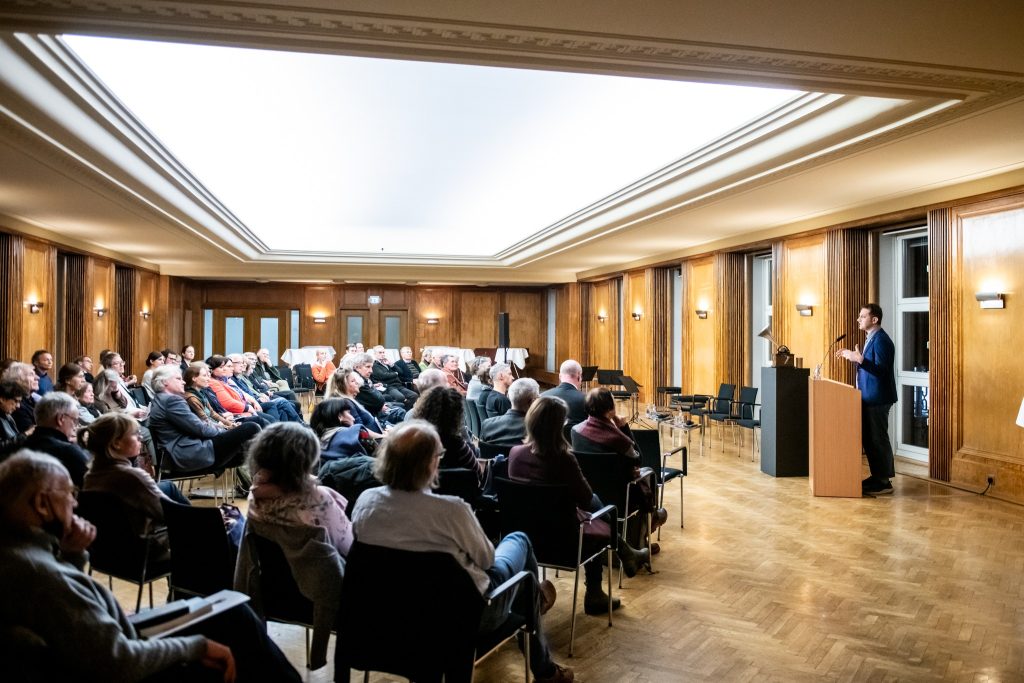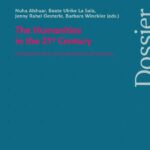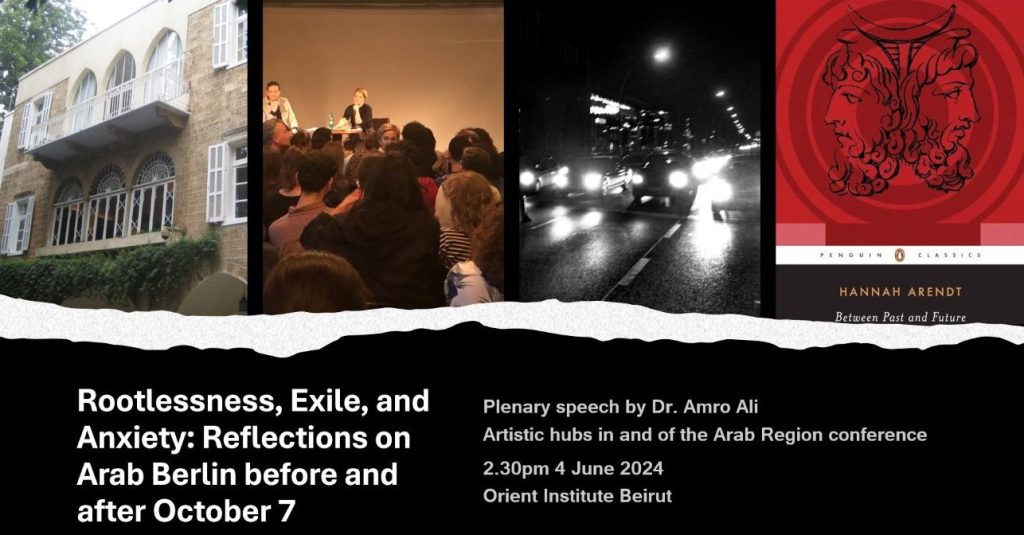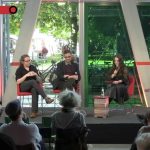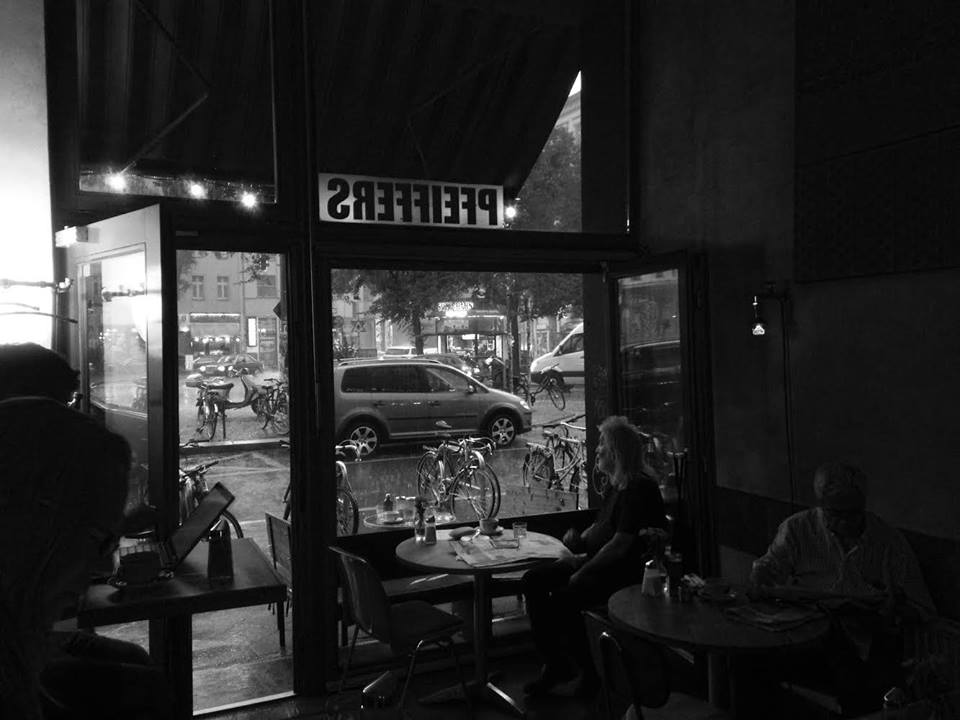
I will be giving a lecture in Berlin on 10 May 2019 at the Volksbühne Berlin which will be based on the essay I wrote in January: On the Need to Shape the Arab Exile Body in Berlin. There will also be three short films shown by Syrian filmmakers and students from Bard College Berlin: Wafa Mustafa, Anas Maghrebi, and Rafat Alkotaini. As well as practitioners in political change will be present. One of the primary aims of the event is to critically engage with the essay, lecture, and films by endorsing or challenging the arguments put forth. Above all, the event is an experiment and exercise in thinking and action in times of gloom and uncharted waters.
The event is organised by Bard College Berlin and the below details and abstract is taken from the Volksbühne website.
Grüner Salon
Diskurs / Discourse
Englisch / English
Einlass 18:00 / Doors open 6pm
“Perhaps it takes an outside perspective, one familiar with the language born of the 2011 Arab uprisings and with the experience of so-called ‘failed’ revolutions to indicate new ways out of an impasse. Egyptian sociologist Amro Ali offers such a perspective: he recently penned an essay characterizing Berlin as an exile capital with enormous potential to be a meaningful political laboratory. The networks of exile have the potential to release immense intellectual and artistic energy into the city, yet the urge for fundamental political change that could emanate from it tends to fizzle out. The fragmentation and lack of political efficacy, which prohibit any capacity for action, raises the question: how could these Arab diasporic spaces overcome their paralyzing political despair and inactivity? Arab Berlin, after all, echoes what New York was for Jewish exiles fleeing Europe in the 1930s and 1940s or Latin American exiles making a home in Paris in the 1970s and 1980s.
In the first part of the evening, Amro Ali will present his ideas on the challenges facing the burgeoning of this political body, and propose a new type of beginning. A beginning for a political discourse in a new, revolutionary, but non-violent “language of consciousness” that respects the dignity of fellow human beings and seeks to enlarge their common space. A beginning through “poiesis” and “praxis” beyond the diaspora, to reach a place where an Arab exile body can enter a shared conversation with other communities.
For the audience, we will specifically invite people from very different political contexts familiar with practices of fundamental change.
In the second part, three young Syrian filmmakers and students from Bard College Berlin, Wafa Mustafa, Anas Maghrebi and Rafat Alkotaini, will respond by showing short films that shed light on the experiences of exile in Berlin – namely, political experiences with an existential dimension in which every human being that prizes thought can access. These artistic contributions might serve as examples of the despair that foments political stalemate and inactivity. They also might be seen as a counter-argument to Amro Ali’s ideas of agency, or even furnish what Amro Ali is asking for, a new beginning that is urgent yet cautious and aware of its vulnerability.
Real Talk is a new series at Grüner Salon that renders visible the political discourse of the young, resistance-oriented, democratic and activist Middle-Eastern diaspora in Berlin and provides space for its debates. This series aims to make evident the transnational realities and struggles between ‘here’ and ‘there’; ‘then’ and ‘now’, differences which Nationalism seeks to deny and erase, and which reveal themselves in the Diasporas. The talks serve as a platform to explore the diaspora’s own thoughts and reactions to these realities. The series in the Grüner Salon aims to create a space where Syrian, Afghan, Yemen, Iraqi and other experts in various discursive and artistic discipline can discuss and perform their work.
The series is a cooperation between Bard College Berlin, the Volksbühne Berlin and the German Council on Foreign Relations. It offers a mix of lectures, short-films, panel discussions and performances discussing themes such as the struggle for survival of the civil society in the Middle East; the re-claiming of political agency; disappeared and missing prisoners; the fate of women in the revolution; the political dimension of the (post-)traumatic; the experience of statelessness; and other topics related to the diaspora.”
de
Real Talk: zur Möglichkeit des politischen Neuanfangs in der arabischen Diaspora
“Vielleicht braucht es eine Außenseiterperspektive, um Wege aus der Sackgasse der politischen Verzweiflung zu weisen. Eine Perspektive, die allerdings vertraut ist mit der Sprache und den Erfahrungen der arabischen Revolutionen. Der ägyptische Soziologe Amro Ali beschrieb jüngst in einem Essay Berlin als Hauptstadt des arabischen Exils, mit dem Potential, ein Laboratorium für politische Aktivität zu werden. Die Netzwerke des Exils setzen in Berlin enorme intellektuelle und künstlerische Energien frei. Doch ihr Drang nach politischer Veränderung verpufft bisher. Die Zersplitterung und der Mangel an politischen Rechten und an politischer Organisation machen sie handlungsunfähig und werfen die Frage auf: Wie könnten die Räume der arabischen Diaspora die lähmende Resignation überwinden? Die Bedeutung, die Berlin heute für das arabische Exil hat, reicht ja durchaus an die Bedeutung heran, die New York in den 30er und 40er Jahren für das jüdische Exil und Paris in den 70er und 80er Jahren für das lateinamerikanische Exil hatten.
Im ersten Teil des Abends wird Amro Ali über die Herausforderungen und Schwierigkeiten sprechen, die es dem arabische Exil so schwer machen, eine politische Instanz zu werden, und er wird einen Neuanfang vorschlagen. Einen Anfang für einen politischen Diskurs in einer neuen, revolutionären, aber gewaltfreien „Sprache der Bewusstheit“, die die Würde der Mitmenschen respektiert und ihre gemeinsamen Räume zu vergrößern sucht. Einen Anfang durch „Poiesis“ und „Praxis“ jenseits der Diaspora, um dorthin zu gelangen, wo ein Gespräch mit anderen politischen Netzwerken und Kreisen möglich ist.
Im zweiten Teil werden drei junge syrische Künstler*innen und Studierende am Bard College Berlin, Wafa Mustafa, Anas Maghrebi und Rafat Alkotaini, mit Kurzfilmen reagieren, die die Exilerfahrung in Berlin beleuchten – als politische Erfahrung mit einer existentiellen Dimension, die jedem sensiblen Menschen zugänglich sein müsste. Diese künstlerischen Beiträge illustrieren einerseits die Verzweiflung, die der politischen Resignation und Untätigkeit zugrunde liegt. Sie könnten sogar als Widerspruch zu Amro Alis Ideen aufgefasst werden. Andererseits sind sie vielleicht selbst schon ein erster, drängender und doch vorsichtiger Schritt hin zu dem, was Amro Ali vorschlägt.
Real Talk ist eine neue Reihe im Grünen Salon, die den politischen Diskurs von jungen, widerständigen, demokratisch-freiheitlich gesinnten Diasporas des Mittleren Ostens in Berlin sichtbar und diskutierbar macht. Es geht um die transnationalen Wirklichkeiten und Kämpfe zwischen dem „hier“ und dem „dort“, dem “damals” und dem “jetzt”, die der Nationalismus auszuradieren sucht und die sich in den Diasporas zeigen. Die Serie gibt syrischen, afghanischen, irakischen und anderen Intellektuellen und Künstler*innen eine Plattform, um politische Themen gemeinsam mit Expert*innen in unterschiedlichen diskursiven und/oder künstlerischen Formaten zu diskutieren.
Die Serie ist eine Kooperation zwischen dem Bard College Berlin, der Volksbühne Berlin und der Deutschen Gesellschaft für Auswärtige Politik. Vorträge, Kurzfilme, Paneldiskussionen und Performances werden die Abende prägen. Der Überlebenskampf der Zivilgesellschaften im Nahen Osten, die Rückgewinnung politischer Handlungsfähigkeit, die in den Gefängnissen Verschwundenen, die politische Dimension des (Post-)Traumatischen, die Erfahrung von Staatenlosigkeit, das Schicksal der Frauen in der Revolution – diese und andere, Diaspora und Welt verbindende Themen werden zur Diskussion stehen.”

